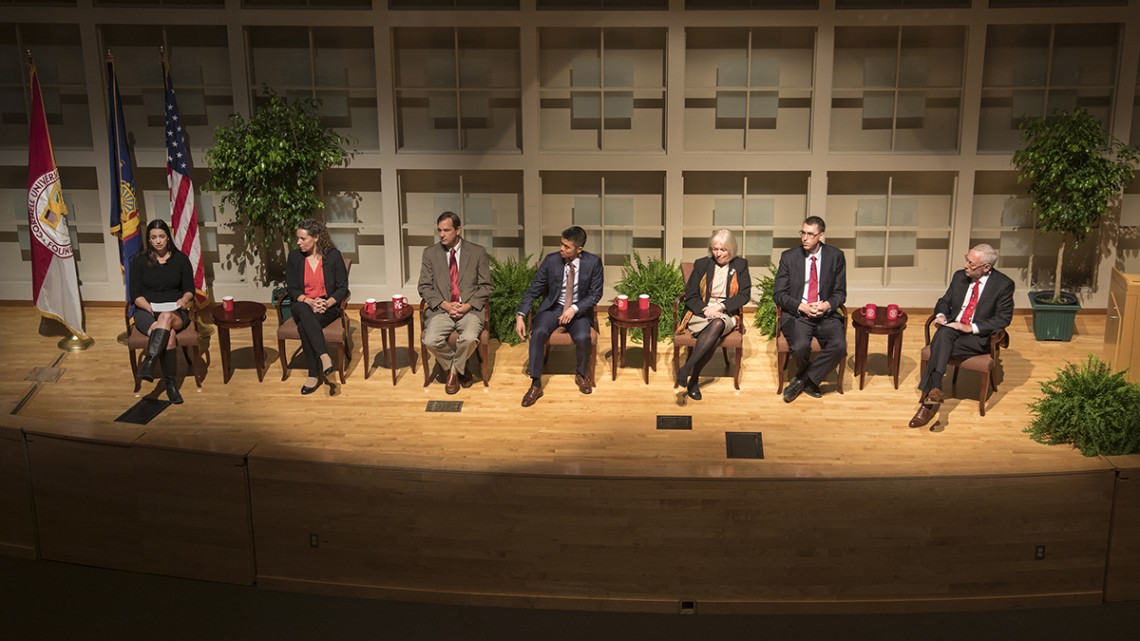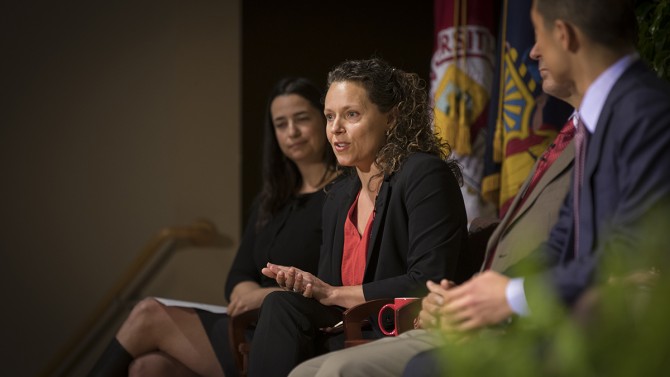
Provost Michael Kotlikoff led a panel of faculty and community partners Oct. 20 to discuss collaborative work and community efforts that engage students in addressing local and global public health challenges, including issues of food insecurity and health equity.
Dr. Monika Safford, M.D. ’86, the John J. Kuiper Professor of Medicine at Weill Cornell Medicine, discussed lessons learned from working with communities, relating them to the mission of the new Cornell Center for Health Equity, which “at its fundamental core is a community partnership,” she said.
As a diabetes researcher at the University of Alabama, Birmingham, she worked with communities in impoverished areas of the state that had stated a need for diabetes programs. Hearing the concerns of diabetes patients led to trials addressing related health issues: pain management and high blood pressure.
“The first important lesson is to listen to the communities about what their priorities are,” she said. “Another lesson is: Use what’s there. Rather than coming in and telling people what you think the solution is … look around at existing partnerships on which you can build.”
With that, she introduced Dr. Michael Berlin, a residency program director at Cayuga Medical Center (CMC) in Ithaca, “which has been a really important teaching site for our medical students,” she said. “It’s oversubscribed; we actually have to turn a lot of students away because they love the experience so much.”
CMC proposed a rural health residency program last summer. “There’s a tremendous shortage in rural areas of primary care physicians so they came to us” and Weill Cornell Medicine was glad to help, she said.
“Our interaction with the community is really embedded in our mission,” Berlin said, “to provide the highest quality health care in partnership with the community. Cayuga has partnered with Cornell for many years, and we view ourselves as an extension of the classroom in that role.”
Gen Meredith, who helps lead Cornell’s Master of Public Health (MPH) program, is a lecturer in population medicine and diagnostic sciences at the College of Veterinary Medicine. She said public health depends on the intersection of environmental, human and animal health and is undercut by issues of equity and sustainability, which the MPH program is working to address.
“We know that the best public health happens at the confluence of research, community engagement and the collective innovation that can happen,” she said. “We’re recognizing the absolute depth and breadth of public health across Cornell University, in research, in teaching and also in public engagement.” The MPH initiative supports “transdisciplinary teaching, engagement and research, hopefully to impart some real impact,” she said.
Randi Lynn Quackenbush, advocacy and education manager of the Food Bank of the Southern Tier, a longtime Cornell partner, said 14 percent of Tompkins County residents “may not know where their next meal is coming from.” Working with its partners, the agency’s efforts to combat food insecurity across six counties include addressing the social determinants of hunger, helping reduce food-related chronic diseases, providing weekend food backpacks for kids and building community advocacy to lead policy change. The food bank and the MPH program are looking to provide transformative learning experiences for students working hand in hand with the community.
David Pelletier, professor of nutritional sciences and director of the Cornell in Washington (CIW) program, said engagement is an important part of the global health minor available to all students, with core courses “and most importantly, spending eight weeks in a low-income setting … and interning with an organization there. Then the students come back after that experience and take a capstone course which I teach, which helps them to integrate what they’ve seen and experienced in the field with the academic knowledge they’ve acquired previously.”
About 500 students have taken the minor in its first 10 years. To deepen training for careers in public health, a major in global and public health sciences was started four years ago, he said, incorporating partnerships with Cornell Health’s Skorton Center for Health Initiatives, Cornell Cooperative Extension of Tompkins County and Cornell in Washington to help provide internships.
“Several organizations have hosted Cornell students over the years,” he said, including partners in Zambia, Tanzania, India and the Dominican Republic.
He introduced CIW alumnus David Lee ’15, “who now is one of our partners in D.C.,” Pelletier said.
A research assistant for the Bipartisan Policy Center’s legislative affairs unit, Lee said: “What I do every day in Washington can be traced directly to my experience as a CIW student back in the fall of 2013,” interning with the White House Office of Legislative Affairs. “The experience allowed me to take what I’d learned in a classroom at Cornell and take that to a setting where people were working on these solutions every day. It’s really important to say my experience at CIW was not unique.”
After an audience member commented on how engagement work engenders enthusiasm in students, Kotlikoff said: “I personally think this is Cornell’s secret sauce – from the very beginning. It was Andrew Dickson White and Ezra Cornell – it was an individual that was interested in knowledge and the highest level of academic achievement, and an individual who essentially said … we need to utilize that information in a way that helps society. And that’s what has led to the breadth of Cornell, which you don’t see in any other Ivy League institution. This combination of absolute excellence and a commitment to impact is what really makes Cornell what Cornell is.”
The panel, “Community Engagement: Collaborative Partnerships Addressing Complex Social Issues,” was a Trustee-Council Annual Meeting event.
This article is written by Daniel Aloi
